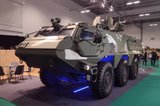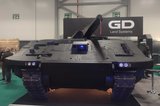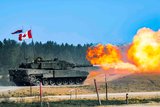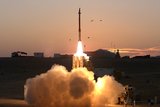FNSS wins Turkish vehicle order which could be worth more than $7.5 billion
The TLF has ordered Pars Alpha anti-armour squad vehicles. (Image: FNSS)
Turkey’s FNSS has won a contract worth up to US$65 million from the TLF for 25 Pars Alpha 8x8 armoured vehicles, which could ultimately be for more than 2,000 vehicles worth more than US$7.5 billion, the company has claimed.
The first order under the New Generation Light Armoured Vehicle (NGLAV) programme is for anti-armour squad vehicles and armoured recovery variants (ARV).
The full scope of the contracts leading from the one just placed would also include 6×6 vehicles and include armoured personnel carrier (APC), command post and infantry fighting vehicle configurations.
The ARV will be fitted with a turntable mounted
Already have an account? Log in
Want to keep reading this article?
More from Land Warfare
-
![US DoD task force’s DroneHunter acquisition lays groundwork for Replicator 2 CUAS strategy]()
US DoD task force’s DroneHunter acquisition lays groundwork for Replicator 2 CUAS strategy
As the US Department of Defense looks to counter the growing threat of uncrewed aerial systems to improve homeland security, the DroneHunter acquisition could point to future commercial innovation.
-
![Norway opts for Hanwha’s Chunmoo for long-range fires under $2 billion deal]()
Norway opts for Hanwha’s Chunmoo for long-range fires under $2 billion deal
The selection of Hanwha’s K239 Chunmoo long-range precision fires system, with a contract expected to be signed on 30 January, makes Norway the second European country to choose the system. It is expected an operational system will be in service within four years.
-
![Layered protection: How air defence is adapting to rising drone and missile threats (podcast)]()
Layered protection: How air defence is adapting to rising drone and missile threats (podcast)
A surge in aerial threats – from advanced missiles to low-cost drones – is reshaping the way militaries approach air defence, driving demand for flexible, multi-layered solutions.























